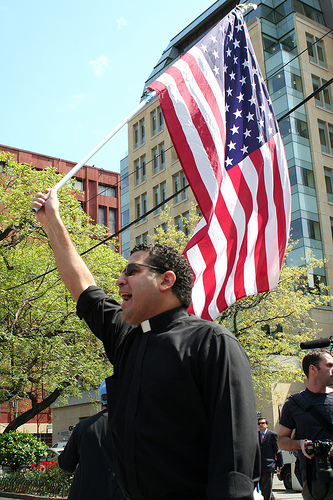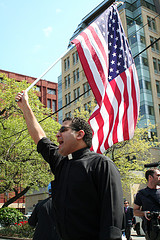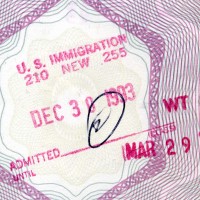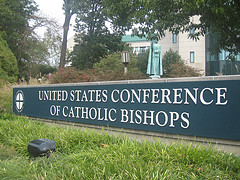I could not come up with a decent rosary meditation at the end of my earlier article on comprehensive immigration reform and the Catholic Church. That’s been tearing me up a little because it’s the challenging issues like this one that need the most prayer and meditation. It is much easier to pray for the issues where I already agree with the Catholic Church like the intrinsic evilness of abortion. I even find it easy to meditate on the theological and moral foundation of immigration reform of how we should treat our fellow brothers and sisters in Christ regardless of their immigration status. But I’m having a hard time swallowing the Church’s enthusiasm over the latest comprehensive immigration bill that recently passed through the senate. But I think I found a mystery of the rosary that helps address my current doubt and worry over the Church’s stance on this bill.
The rosary mystery that comes to mind when I think about the immigration reform bill is the Third Luminous Mystery — The Proclamation of the Kingdom of Heaven and Jesus’ Call to Conversion. We should meditate on the first part of the title — the proclamation of the kingdom of Heaven. Jesus came into the world to proclaim that there is something greater to live for than what we see around us in our lives. He prepared a place for us in Heaven. Jesus told us what we need to do to live for His Kingdom:
“Love the Lord your God with all your heart and with all your soul and with all your strength and with all your mind; and, Love your neighbor as yourself (Luke 10:27). ” Immediately following, Jesus tells the parable of the Good Samaritan to point out that everyone is our neighbor.
Jesus didn’t attach conditions to His call to love one another. He didn’t instruct us to love our neighbor, but only if doing so wouldn’t have a negative impact on the economy. He didn’t say love your neighbor, but not if they broke the law. He didn’t instruct his disciples to secure the border before they could start loving and showing compassion to those around them. And so when it comes to the immigration reform issue, I think the United States Conference of Catholic Bishops is trying to echo a similar sentiment as Jesus in the Third Luminous Mystery of the rosary. They want to show us that it is far more important to live for Jesus’ Kingdom and follow His laws regardless of the social, economic, and political impact in this world.
Loving our neighbor unconditionally is difficult particularly when it might have an adverse affect on our social or economic well-being. Or maybe it is hard to swallow teachings that conflict with our political ideology. We only know this world and this life and we try our best to find as much comfort and happiness in it. But God does not want us to constrain our thinking to the here and now but remember that there is a larger picture involved. He calls us to spend eternity in the happiness of Heaven. So even if our economy and society collapses and we lose our comforts in this world, if that happens because we loved our neighbor, we will gain infinitely more. But seeing our laws through that lens is tremendously difficult.
But the Third Luminous Mystery doesn’t end with the proclamation of the kingdom of Heaven. It ends with Jesus calling us to a life of conversion. Jesus understands that almost everyone will have a hard time letting go of the comforts of this world and embrace living for His heavenly kingdom. He knows that all of us need to undergo conversion in one form or another. And so this mystery doesn’t end with Jesus giving us an ultimatum that we must immediately accept leaving no room for error. Instead, Jesus acknowledges that we may not be 100% on board with His teaching, but that’s alright. He wants us to make an effort to align our ways with His ways. He knows that it will be challenging to follow Him and we will stumble, but He gives us all the tools through the magisterium of the Catholic Church that we need to stay on that path.
We pray and meditate on the rosary, particularly the Third Luminous Mystery, that we orient our lives toward God’s heavenly kingdom and make whatever course corrections we need to get there. I’m certainly not there yet on issues like the comprehensive immigration reform bill. And I think there are other ways we can love our neighbor and reform our immigration policies without implementing yet more massive government programs. But at least I understand where our US bishops and Church leaders are coming from. They are trying to offer a glimpse of how God views these issues which is very different from how many of us might see them. Much like how we have faith that there is a heavenly kingdom that awaits us after this life, maybe we also should show a little faith in our Church leaders. It’s easy to have faith in people when you completely agree with them. But real faith is believing even when you have doubts. But with the help of Mary, the saints, and the Holy Spirit, maybe we’ll be able to conquer that doubt and not fear what we have to lose in this life but rejoice in all that we will gain in the next.
Related articles
- Immigration: Theology vs. Politics (rosarymeds.com)
- A World on Fire (rosarymeds.com)
- False Triumphalism Is Not Faith and Why WYD Will Be in Poland (supertradmum-etheldredasplace.blogspot.com)
- Campaign demands Christians give ‘dignity’ to illegals (wnd.com)
- Religious leaders weigh in on immigration debate (kansascity.com)
- Along the Road: The Good Samaritan, Trayvon Martin, and what it means to be a neighbor (drewdowns.net)
- This Extraordinary Pope (dish.andrewsullivan.com)








